- Home
- Joel C. Rosenberg
Without Warning Page 13
Without Warning Read online
Page 13
Now I had to sit down. I felt light-headed and shaky. The bitter truth was now crystal clear—my mother and Josh had been murdered because of me. Annie and Katie were fighting for their lives because of me.
Harris then told us that the arson investigators believed the fire had been set around seven thirty. Matt and I knew full well what that message was and who had sent it.
“Seven thirty, you’re sure?” I asked.
“Give or take ten minutes,” Harris said.
I was coming to the painful realization that if we’d gotten home when Matt and I had originally planned, we might have been able to break up the attack—or been killed with the others. The storm had slowed us down, and in doing so it might also have saved our lives. But that was little comfort.
“What else can you tell us, Agent Harris?” I asked. “Please tell me you have some suspects.”
“Not yet, but we’ve got some leads,” he replied.
“Like what?”
“The clerk at the Shell station on Main Street said two men in their thirties came in yesterday around dinnertime. They looked Middle Eastern. One used the restroom. The other bought bottles of water. He paid with cash. But we ran the video from the closed-circuit cameras and came up with a car and a license plate. We’ve got an APB out and my team is looking at footage from every camera in Bar Harbor. We’ll find it—I promise you that.”
Six hours later, they did, on some side street in Augusta. Little good it did, however. There were no security cameras in the area, so the FBI had no idea what these two were driving now, who they were, or where they were headed. As far as I was concerned, the trail had gone cold.
On Sunday morning, I sat with Annie and Katie, who were now in the same ICU. I insisted Matt take a break, go get a hot shower, and get some sleep or at least lie down for a while and rest. He’d been understandably reluctant to leave his wife and daughter, of course. But there had been no movement, no progress, no news, and the two of them didn’t even know he was there. I promised to call him if either or both of them woke or if there were any developments at all. Finally he agreed.
By Sunday evening, Matt was back at the hospital and it was my turn to take a break. I sat on my bed in a Motel 6 on the outskirts of Portland, surrounded by containers of half-eaten Chinese food and empty bottles of Coke Zero and craving a real drink more intensely than any time in days. But there was no minibar, and with killers out there somewhere hunting for me—and a messy nor’easter bearing down on us—I wasn’t about to head out to find a liquor store. I took a shower instead.
Just after nine, a text message came in from Allen. It said the president was about to give his third press conference in as many days, and the press pool was picking up rumors there might be an important update on the hunt for the terrorists. I thought of the two FBI agents parked in the room next door, assigned to watch my back, and the dozen federal agents and handful of local cops at the hospital, watching over Matt and his surviving family.
I didn’t think ISIS was likely to come after me again—not now, not with a media feeding frenzy surrounding us.
But Harris refused to take any chances. And I was grateful.
34
As I waited for the president to speak, I was going stir-crazy.
For much of the last twelve hours, I’d been responding to a blizzard of e-mails concerning the memorial service, and once again my circuit breakers were blowing. For one thing, my mom’s church was in the midst of extensive renovations due to a burst water pipe several weeks earlier, and the sanctuary was in no condition to host an event that was drawing national media attention. That necessitated finding another church facility, and I eventually chose St. Saviour’s Episcopal Church, located close to the center of town. The building was beautiful and historic, and its sanctuary held 280 people, making it one of the largest on the island.
That, it turned out, had been the easy part. Now I was dealing with a torrent of questions from the director of the funeral home, the church secretary, the florist, the driver of the hearse, and dozens of my mom’s friends and hundreds of other well-wishers.
Hour by hour, the condolences kept pouring in by e-mail and text message, not just from the local area but from all over the country. I couldn’t keep up. I wasn’t cut out to be a social secretary. But I knew I had to keep it all off of Matt’s shoulders. He was proving himself stronger than I’d feared, but he didn’t have the bandwidth for any of this right now.
I finally sent a text to Allen, apologizing for not being in touch sooner. He wrote back immediately, offering his own condolences and saying he’d already had Mary Jane cancel my flight to Amman. He told me I didn’t need to come back to work anytime soon. He knew I couldn’t write about what I was going through or be a source for other Times reporters covering it, even though this was big, front-page news. He was just happy to know I was still alive.
As I hit Send on a response to yet another e-mail, President Taylor entered the White House pressroom to a thousand camera flashes. I set my phone down, picked up the remote, and turned up the sound on the TV perched atop the dresser.
“Tonight I want to update you on the tragedy of the past few days,” the president began. “As you know, terrorists have unleashed attacks in nine American cities and towns, beginning with our nation’s capital and most recently in the small seacoast town of Bar Harbor, Maine. These cowardly attacks came without warning and without remorse. These are despicable, cold-blooded acts. They were unprovoked and unconscionable, and they will not be tolerated.”
There it was again. Without warning. Was this really what the intelligence community was telling him? No attacks in American history had been more clearly telegraphed. Abu Khalif had done everything but fax a map and a timeline to the White House Situation Room. The president and his national security staff simply didn’t want to believe it. They still had no idea what they were really up against, and we were all paying the price.
“As of this hour, some 4,647 American citizens and residents, and 62 foreign nationals—not counting the perpetrators—have been killed in terror attacks on the American homeland over the course of the past week,” the president continued.
It was a chilling statistic. It represented 1,651 more deaths than the 2,996 people killed during the 9/11 attacks in 2001. I could only imagine Abu Khalif’s twisted pleasure upon hearing the news that he had, in one day, killed half again as many Americans as his onetime mentor, Osama bin Laden.
The president then added that the sarin gas had wounded an additional 6,114 people, many of whom were in critical condition. He asked the nation to send “thoughts of peace and healing” to the families of the deceased and to those “suffering from the cowardly actions of these violent extremists.”
Even with the nation under attack, he refused to utter the phrase Radical Islam, much less apocalyptic Islam.
Disgusted, I reached for the remote to mute the TV and get back to work. But then the president said that he had ordered U.S. bombers and fighter jets to attack ISIS positions inside Syria. That caught my attention. A map flashed up on the large monitor mounted over his left shoulder. The graphics indicated the position of the most recent air strikes, just inside the Syrian border with Iraq. The president claimed that in the last twenty-four hours, American forces had killed 612 fighters loyal to Abu Khalif, all of whom were hiding out in these border regions. Most of them, he said, had previously fought in Iraq but had been pushed back into Syria due to U.S. operations to liberate Mosul and other northern Iraqi towns and villages.
Did this represent a fundamental shift in U.S. strategy against ISIS, or a weekend diversion? I wondered. Now that Abu Khalif had struck inside the American homeland, was Taylor finally heeding my advice to take the gloves off and go after ISIS and its leader inside Syria, regardless of how much the Russians and Iranians and the U.N. secretary general protested?
For the moment, I could only hope. The president didn’t say. Not exactly. Instead, he offered another tantalizin
g nugget. He explained that he was expanding authority for the CIA to use drone strikes against high-value ISIS targets inside Syria as well as in Yemen, Libya, Afghanistan, and the Bekaa Valley in northeastern Lebanon. Then a face flashed up on the screen. I recognized it instantly: Tariq Baqouba.
“I can report to the American people that these expanded drone strikes are already having a devastating effect on the enemy,” the president said. “Just hours ago, U.S. forces identified, targeted, and killed Tariq Baqouba—ISIL’s number-three-ranked leader—in a drone strike near the Syrian-Iraqi border. In recent months, Baqouba was ISIL’s operations chief, responsible for terrorist activity throughout the Middle East and North Africa. While we do not believe he was the mastermind of last week’s attacks inside the United States, we have solid intelligence indicating he played a key role in executing those attacks. Last fall, Tariq Baqouba led ISIL forces in a raid against a Syrian military base near Aleppo. It was this incident that allowed the group to capture precursors for chemical weapons—specifically for sarin gas—and thousands of artillery shells to deliver them. Tonight, a savage killer was brought to justice, and you have my word: there is more to come.”
At this point, Taylor took a few questions.
No, the FBI still had not made arrests of anyone in connection to the attacks in Washington or in any of the six cities where chemical weapons had been unleashed against the American people.
No, the FBI had made no arrests in the attack on the Collins family in Maine.
Yes, the bureau had offered a $5 million reward for information leading to the arrests and convictions of suspects in all of these cases.
Yes, there had been a huge spike in calls to the FBI tip line.
No, he couldn’t comment any further on ongoing investigations.
Then it was over.
That was it? I thought. That’s all the detail you’re going to give us?
I shouted something profane and threw an ashtray at the wall. I didn’t need vague answers to meaningless questions. I needed real results, and I needed them now.
35
Suddenly there was rapid knocking at the door.
The two agents assigned to protect me had come to check on me. They’d heard my yell and the crash of the ashtray and wanted to know if I was all right. I cracked the door open, apologized, and told them I was fine. They looked skeptical but eventually went back to their room.
When I heard them open and shut their door, I walked over to the windows. I pulled back the curtains, ever so slightly. It was snowing hard. The cars in the parking lot were covered with another several inches of fresh powder. What I wouldn’t give to be free for a few days and head to Killington with some friends on a ski getaway.
My mobile phone rang. The number was Allen’s.
I was about to ignore it but thought better of it. Maybe my brother was right. It wasn’t exactly a wise career move to chronically blow off the boss. If I was going to leave the Times, then I should do so on my own terms, with a plan of what I was going to do next. To get myself fired for no good reason was just plain stupid.
“Hey, Allen,” I said, my voice hoarse and laced with fatigue.
“Hey. I didn’t actually expect to reach you. How are you?”
“I honestly don’t know how to answer that,” I admitted.
“I’m so sorry. I can’t imagine what you’re going through.”
“No, look, I’m the one who’s sorry—about Jordan, about not answering your calls, about being, well, you know.”
“Forget it, J. B. You don’t have to apologize. I understand. Believe me.”
“Thanks,” I said. “And thanks for your text, too, by the way. I appreciate it. So what’s up?”
“Well, I just landed in Bangor, just rented a car. I should be in Bar Harbor in about ninety minutes.”
“You’re serious? You’re going to Bar Harbor?”
“Of course,” he said.
“Well, thanks, but—and please don’t take this the wrong way—but why?”
“I spoke to your mom’s pastor this afternoon,” he explained. “He and his staff have gotten calls from every network and every national paper, the AP, Reuters, you name it. They’re all coming up to cover the service. CNN wants to broadcast it live. It’s becoming a major media event. Plus, with the VP flying up, the Secret Service is getting involved. The pastor’s being deluged. He asked me for some advice. I said I’d be happy to come up and help, and he jumped at the offer.”
“The vice president is coming?” I said, my stomach tightening.
“You didn’t know?” he asked.
“No, but then again, why would Holbrooke tell me? I’m just running the thing.”
“Well, according to my source at the White House, he’s coming. Anyway, the pastor said he needed someone to manage the media at the memorial service—said it’s going to be a madhouse. He didn’t know anyone else who could do it, so I decided I would.”
“That’s very kind of you, I guess,” I said.
“It is, actually, but that’s not even the reason I called.”
“What is?”
“I have news.”
“What kind of news?”
“A front-page exclusive.”
“By whom?”
“Bill Sanders.”
“On what?”
“The hunt for Abu Khalif.”
“What are you talking about?” I said. “Why is Sanders writing about Khalif?” Bill Sanders was the Cairo bureau chief for the Times. ISIS and Khalif were not his usual beat.
“Because you aren’t,” Allen said. “And because after you, he’s the best Mideast correspondent we have. I asked him to work his sources and find out what’s being done to track down the emir of ISIS and bring him to justice.”
“And?”
“You’ll see when you read the article. Make sure to pick up a copy of the Times bright and early tomorrow. Look, I gotta go. I’ll call you in the morning.”
With that, Allen MacDonald was gone. But there was no time to process all that he’d just said. For no sooner had Allen hung up than the phone rang again.
“Hello?” I said, not recognizing the number. I wondered if it might be the VP’s office.
“Is this J. B. Collins?” asked the man on the other end of the line.
“Who’s asking?” I said.
It was not a voice I recognized.
“My name is Steve Sullivan.”
“Okay.” The name was familiar, but I couldn’t immediately place it.
“I’m the lawyer in Portland who’s representing the Khachigian estate. I’ve written you a number of e-mails but haven’t gotten any replies.”
Now I remembered the name and the e-mails. I’d fully intended to write back, but I guess I never actually had. Sullivan’s first e-mail had been rather cryptic. He’d indicated that he’d had important business to discuss with me concerning Khachigian’s will. He’d said it was a sensitive matter that necessitated meeting in person. The rest of his e-mails were all variations on that theme. Since I had no idea what Khachigian’s will could possibly have to do with me, it hadn’t seemed that urgent given everything else going on.
I apologized and started to explain what had happened with my family.
“Yes, I know, and I’m very sorry for your loss, Mr. Collins,” he said. “Truly, I am.”
“That’s very kind, Mr. Sullivan,” I replied. “So you’ll understand why I’m not in a position to meet at the moment.”
“Actually, Mr. Collins, I must inform you that this is an urgent matter that cannot wait any longer,” Sullivan countered.
Generally I applauded tenacity. But this was going too far. “Well, it will have to, Mr. Sullivan. I’m afraid I’m far too busy for this right now. But please, have a good night.”
Before I could hang up, however, Sullivan quickly explained that he was in possession of a sealed envelope that I needed to see. “It’s marked in Khachigian’s own handwriting,” he said. “The note re
ads, ‘If I am killed in mysterious circumstances, please get this to James Bradley Collins immediately.’”
36
PORTLAND, MAINE
My return to Bar Harbor would have to wait.
I arrived at the offices of Sullivan & Sullivan, attorneys at law, at precisely 8 a.m., briefcase in hand. The firm didn’t typically open until nine, but I didn’t care. I’d told this guy if he really wanted to meet with me, that’s when I’d be available. Not a moment later.
I’d been driven by two agents from the bureau, and the agent behind the wheel of our unmarked bureau sedan kept the engine running while his partner went inside to check things out. Five minutes later, he exited the three-story brick building and gave us an “all clear” signal. The driver parked and escorted me inside.
The decor was humble but tasteful. This wasn’t a high-powered firm with a lot of Washington and Wall Street connections. Indeed, I suspected Robert Khachigian had been the Sullivans’ highest profile client by far. The walls needed a fresh coat of paint. The chairs in the foyer were ready to be reupholstered. The magazines were out of date. The computer on the receptionist’s desk looked like it had to be a good ten years old. The aroma of pipe smoke, carpet cleaner, and instant coffee wafted through the air.
Steve Sullivan greeted me with a firm handshake. He was younger than me, no more than thirty-five, I thought, despite the receding hairline that no doubt came from too many hours and too much stress. He wore a gray three-piece suit that looked like a throwback to a different generation, despite the brand-new and rather stylish dress shoes that squeaked when he walked. He asked if I wanted some coffee or a glass of water, both of which I declined, and then he ushered me down a hallway and into a moderately sized corner office overlooking Portland’s main thoroughfare.
An elderly man, surely in his eighties, stood when I entered.

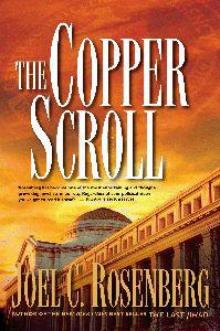 The Copper Scroll
The Copper Scroll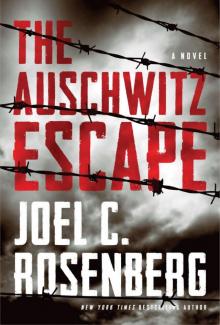 The Auschwitz Escape
The Auschwitz Escape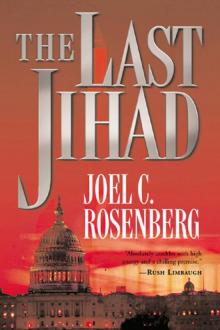 The Last Jihad
The Last Jihad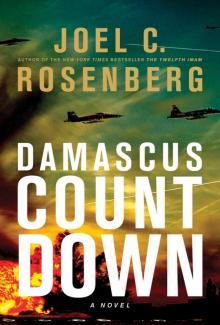 Damascus Countdown
Damascus Countdown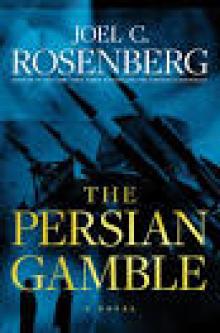 The Persian Gamble
The Persian Gamble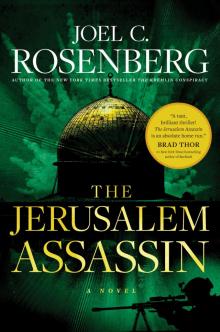 The Jerusalem Assassin
The Jerusalem Assassin Dead Heat
Dead Heat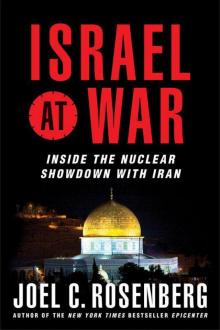 Israel at War: Inside the Nuclear Showdown With Iran
Israel at War: Inside the Nuclear Showdown With Iran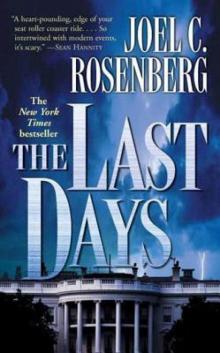 The Last Days
The Last Days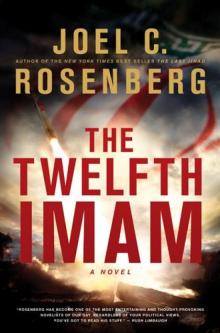 The Twelfth Imam
The Twelfth Imam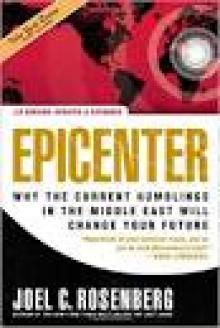 Epicenter 2.0
Epicenter 2.0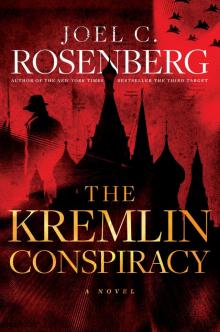 The Kremlin Conspiracy
The Kremlin Conspiracy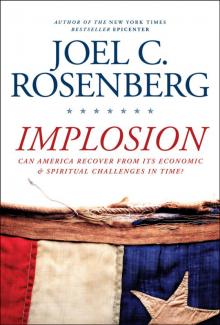 Implosion: Can America Recover From Its Economic and Spiritual Challenges in Time?
Implosion: Can America Recover From Its Economic and Spiritual Challenges in Time?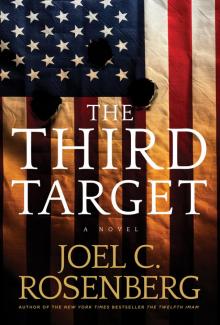 The Third Target: A J. B. Collins Novel
The Third Target: A J. B. Collins Novel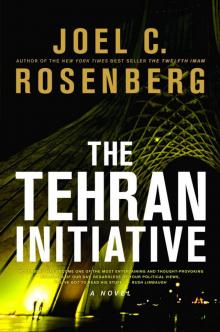 The Tehran Initiative
The Tehran Initiative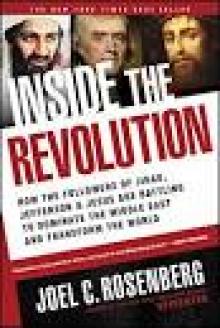 Inside the Revolution
Inside the Revolution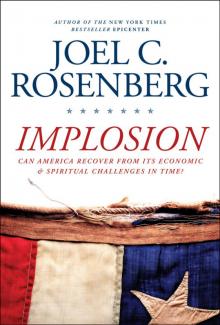 Implosion
Implosion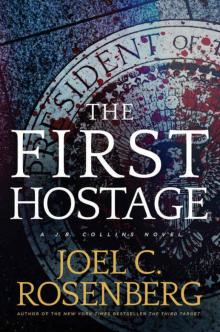 The First Hostage: A J. B. Collins Novel
The First Hostage: A J. B. Collins Novel